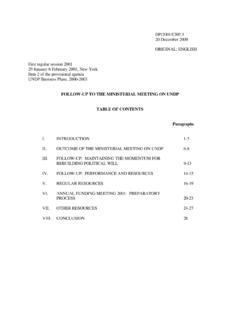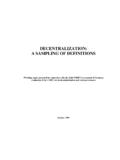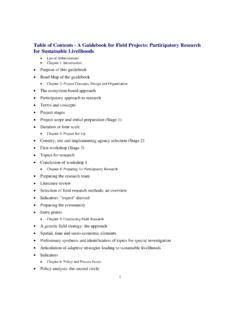Transcription of United Nations Development Programme - UNDP
1 United Nations Development ProgrammePeer-Review of the Methodology of the Citizen Security Programme inTrinidad and TobagoA Publication of the undp Trinidad and Tobago Country Office23 PEER-REVIEW OF THE METHODOLOGY OF THE CITIZEN SECURITY Programme IN TRINIDAD AND TOBAGOPEER-REVIEW OF THE METHODOLOGY OF THE CITIZEN SECURITY Programme IN TRINIDAD AND TOBAGOUNDP Trinidad and Tobago Country Office In 1961, undp established a Country Office (CO) in Trinidad and Tobago, which has been supporting the country's national Development agenda for over fifty years. undp T&T currently has a multi-country mandate with responsibility for Programme Development and execution also in Aruba, Curacao, Sint Maarten and Suriname.
2 The overarching goal is to create an enabling environment for inclusive and sustainable human Development by focusing on the following thematic areas: Poverty and Social Policy: Assisting in the eradication of poverty and reducing inequalities and exclusion by informing policy and Programme Development through a mixture of policy advice, advocacy and downstream initiatives through various poverty-related projects and and the Environment: Supporting implementation and management of various programmes which help to minimize negative environmental impacts and facilitating funding to civil society organisations, through the GEF Small Grants Programme , to help communities build resilience by responding and adapting to climate Governance: Working through and with initiatives that seek to facilitate an environment for trust-building and consensual decision-making and collaborating with Parliaments to strengthen executing functions so as to better serve the Security and Youth Development .
3 Building institutional capacity to tackle crime and violence; providing technical expertise to the Government and other partners in crime prevention and response; supporting criminal justice reform and advancing programmes aimed at empowering and developing young Review Citizen Security Programme , Trinidad and TobagoCopyright 2015By the United Nations Development ProgrammeUN House, 3A Chancery Lane, Port of Spain, Trinidad and TobagoAuthor: Marianna OlingerRevised by: Jos Mart n and Jayson LangeExecutive SummaryThe Citizen Security Programme (CSP) is a primary violence prevention Programme initiated by the Ministry of National Security of Trinidad and Tobago (MNS) and financed partially by the Inter-American Development Bank (IADB).
4 The Programme methodology is based on a three pillar structure: combining community action, assistance to the Trinidad and Tobago Police Service; and institutional strengthening of the MNS. The Programme was started in 2007 in 22 communities identified as high-risk in Trinidad and Tobago. The Programme s methodology focuses on: addressing key identified risk factors based on the ecological approach to violence prevention; working with individuals, communities and the broader society across the country; and providing them with the tools, knowledge and support required to identify and deal with the risk factors related to violence.
5 The peer-review of the Citizen Security Programme of Trinidad and Tobago (CSP) was coordinated by the United Nations Development Programme ( undp ) with the objective of analysing the Programme s methodology and its contribution to strengthening a community-based and community-run approach to violence prevention and the extent to which it could be expanded. The assessment of the methodology was guided by criteria of relevance, effectiveness, impact, and OF THE METHODOLOGY OF THE CITIZEN SECURITY Programme IN TRINIDAD AND TOBAGO1. Introduction Citizen security: A human centred approach undp The IADB rationale 2.
6 Violence and insecurity in Trinidad and Tobago3. undp Peer-review of the Citizen Security Programme : Scope and Methodology 4. The Citizen Security Programme (CSP) Programme approach and methodology of action Main Citizen Security Programme methodology strengths 5. An overview of indicators of impact and performance and the CSP s approach to monitoring and evaluation 6. The Citizen Security Programme s current challenges for sustainability and expansion7. Operational challenges8. Opportunities for partnering with other stakeholders 9. Messages distilled from partners and beneficiaries on overall context and needs10. Concluding remarks and recommendations 11.
7 Brief on best practices identified elsewhere12. References table of CITIZEN SECURITY: A HUMAN CENTRED APPROACHIn the last three decades, the definition of security has undergone major changes. For a long time this concept revolved around the defence of interests of states such as sovereignty and autonomy. However, the idea that security is equivalent to national security or state security against possible external aggression, the belief that security threats are mainly military, and the view that such threats have an objective basis to identify them regardless of political considerations, have been questioned internationally.
8 (Lipschutz, 1995). In the search for alternatives to break patterns of crime and violence, the concept of citizen security has gained attention among scholars, government and non- governmental institutions. Citizen security in this sense can be regarded as a dimension of human security, based on a fundamental understanding that governments retain the primary role for ensuring the survival, livelihood and dignity of their citizens. (IACHR, 2009). One such approach is based in the belief that balanced Development reduces and prevents the emergence of crime as a major social problem. Couple this with strong crime reduction and prevention techniques, facilitates the achievement of Development goals.
9 In this construct, citizen security is conceived as the social situation in which all persons are free to enjoy their fundamental rights and in which public institutions have sufficient capacity, against a backdrop of the rule of law, to guarantee the exercise of those rights and respond efficiently when those rights are pattern and concentration of violent crimes in the communities of the urban poor described in the Caribbean Human Development Report (2012), suggests the association of crime with exclusionary processes have long histories. The report also points to the fact that contemporary, predominantly repressive approaches to safety and security in the region, have resulted often in vicious cycles that make crime control and prevention more difficult.
10 Nevertheless, vicious cycles of unbalanced Development that generate high levels of crime and insecurity that, in turn, impede Development may be transformed into a virtuous circle. The negative impact of crime on Development in its various aspects is well documented in the past decade. Crime, particularly violent crime, tends to have a negative impact on vulnerable economies and erode confidence in the future Development of countries; reducing the competitiveness, imposing burdensome security costs, and may negatively alter the investment climate. (HDR, 2012) In addition, Introductionthe quality of education and health care tends to suffer as scarce resources are diverted to control violence and crime.









